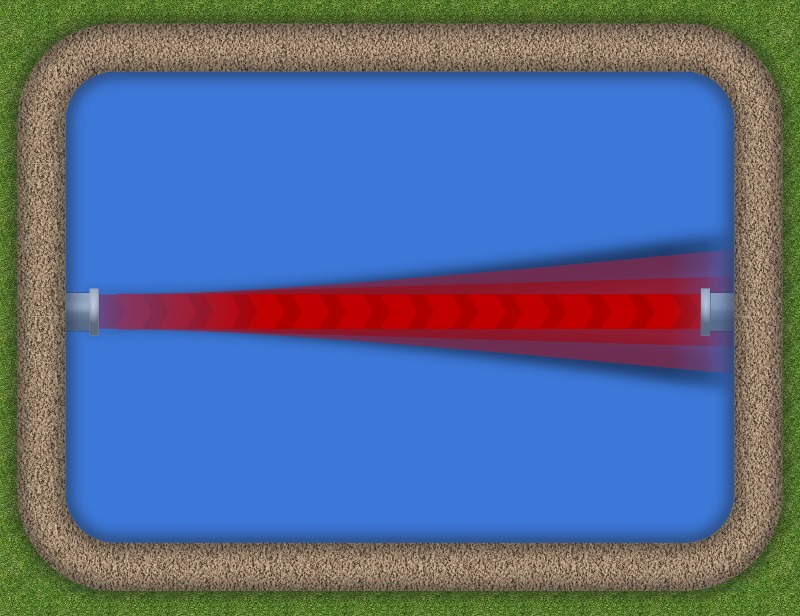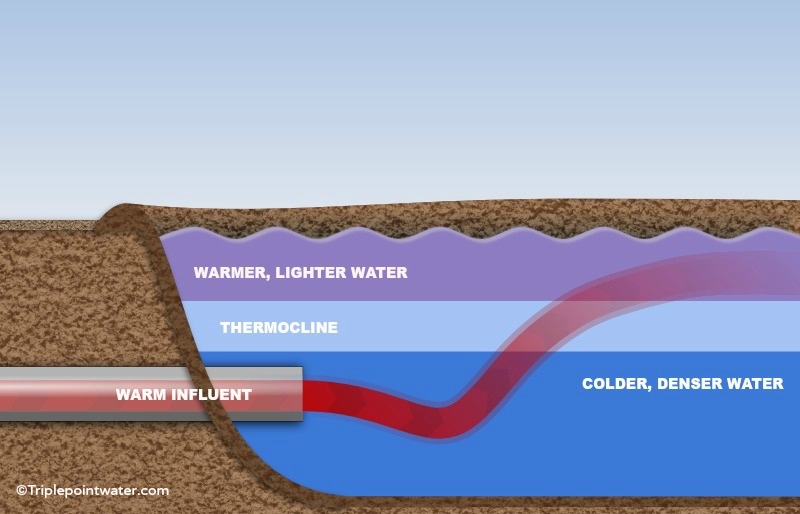We’ve referenced short-circuiting several times as a potential cause of wastewater lagoon effluent problems. A lagoon is more likely to short circuit in the winter, when influent wastewater is warmer than the lagoon temperature, so it’s a good time to examine the topic in a little more detail. In this article we’ll define what short-circuiting is and what causes it. In a future blog we’ll reveal how to diagnose and prevent it.
What is a wastewater lagoon short circuit?
Simply put, wastewater lagoon short-circuiting is when wastewater “short circuits” or takes a short-cut through the lagoon, bypassing the treatment process. Retention time is key to wastewater treatment—if wastewater doesn’t have enough contact with digesting microbes, it doesn’t get treated, and you get high TSS and BOD in your effluent.
What causes a lagoon to short circuit?
Short-circuiting has many causes:
1. Flaws in lagoon design: Lagoon design, such as the placement of influent and effluent pipes, can contribute to the likelihood of short-circuiting. A single influent pipe can forcefully push wastewater toward the effluent side of the pond. A lagoon oriented in such a way that it’s affected by wind is also subject to short circuit.

2. Infiltration & inflow: A huge influx of stormwater can overwhelm the lagoon and disrupt the treatment process. For more about lagoon I&I, read our blog, Lagoon Infiltration and Inflow: Problems and Solutions.
3. Sludge accumulation: Sludge buildup, in addition to reducing lagoon capacity and thereby retention time, can also create channels that wastewater flows around.
4. Stratification: Stratification is when water settles into distinct layers due to differences in temperature (thermal stratification) or dissolved oxygen (DO) content (biological stratification). The colder, denser water sinks to the bottom of the lagoon, creating an anoxic zone with low DO and high BOD. The shorter winter days with less solar radiation and cold winds create some lagoon mixing, as colder surface water continually displaces the warmer water at the bottom. However, without mechanical aeration throughout the water column, the warmer influent doesn’t get incorporated into the overall environment of the lagoon. Taking the path of least resistance, the warm influent rides the thermocline, or thin dividing layer between strata, above the heavier, colder water, and doesn’t get treated.

Problems lagoon short circuit can cause
The lack of treatment that short-circuiting causes is due to insufficient retention time. Retention time is key to wastewater treatment: Digesting microbes need time and good DO levels to remove BOD and pathogens. Wastewater that short circuits through the system can have effluent BOD and TSS levels as high as the influent. And even if just a small amount of the total inflow is short-circuiting, it can have a big impact on discharge quality. According to Shilton and Harrison’s Development of Guidelines for Improved Hydraulic Design of Waste Stabilization Ponds,”If only a small fraction of the total flow is short-circuiting without adequate treatment, then this still contributes a disproportionately large amount of the contaminant remaining in the effluent.”
Short-circuiting is a major cause of wastewater lagoon effluent issues. In our next blog, we’ll talk about the problems that short-circuiting can cause and outline ways to prevent and correct lagoon it. If you suspect your wastewater lagoon is short-circuiting, contact us. We are wastewater lagoon experts, and we can help.
